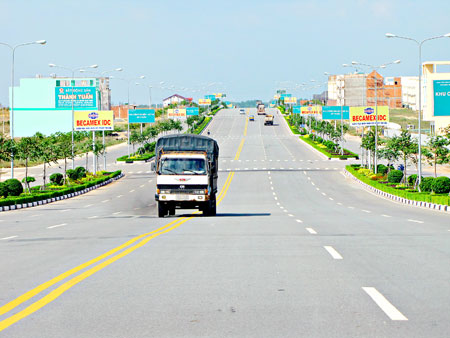Japanese companies invest in Vietnam
More and more Japanese companies have invested in Vietnam, because they have a more long-term view. This is a topic of an article issued on the Financial Times. The topic explained why Vietnam has attracted foreign investors and Binh Duong has become an attractive destination for Japanese companies.
 My Phuoc-Tan Van Road links My Phuoc Industrial Park with
Binh Duong New City, HCMC’s distrct 9, Long Thanh Airport and Thi Vai deep-water port.
My Phuoc-Tan Van Road links My Phuoc Industrial Park with
Binh Duong New City, HCMC’s distrct 9, Long Thanh Airport and Thi Vai deep-water port.
From sources of the Japan External Trade Organisation (JETRO), the Financial Times said in the past year a record of 208 Japanese companies were set up in Vietnam last year, pledging to invest over $1.8bn. In 2010, as many as 114 Japanese companies came to Vietnam, vowing to invest $2bn. The Financial Times also added that while Japan still ranks behind Taiwan, South Korea and Singapore in terms of registered foreign investment capital in Vietnam, Japan is leading the way in terms of implemented investments. Tony Foster, managing partner of the Vietnam office of Freshfields Bruckhaus Deringer, the law firm, says Japanese companies have been “jolted into action” since the earthquake that struck the east of the country in March. “Japanese companies are realising that they’re not going to survive just in Japan, the Japanese government is also supporting diversification into Vietnam for geopolitical reasons.”, says Mr Foster.
Foster’s company advised Mizuho, the banking group on its $567m acquisition of a 15 per cent stake in Vietcombank, one of Vietnam’s biggest state-controlled institutions. Export-focused manufacturers such Bridgestone, the world’s biggest tyre maker, and Panasonic, the electronics group, are setting up factories in Vietnam. “Until recently, many Japanese manufacturers were looking to China, but it is more and more difficult because the currency is strong and wage costs are rising rapidly,” writes the Financial Times. A senior executive from a Japanese trading house with a presence in Vietnam says “Japanese companies like the political stability in Vietnam, which comes free of the historical animosity and present-day rivalry that looms over China-Japan relations”.
Meanwhile, in Vietnam, inflation exceeded 18 per cent in the past year, however companies such as Tamron, which makes lenses for the world’s leading camera brands, are not deterred by this economic instability. “Vietnam is very friendly for Japanese investors and the wage levels are acceptable,” says Shoji Kono, a corporate vice-president at Tamron, which plans to build a $13m factory near Hanoi that will eventually employ 2,000 people. Tamron set up its first overseas factory in Foshan, in the industrial heartland of China’s Pearl River Delta. It is one of many global manufacturers, not just Japanese, that want to diversify their production away from China to cut costs and reduce their dependence on one manufacturing base – a risk exposed last year by the floods in central Thailand and the earthquake and tsunami in Japan.
Tamron, along with many manufacturers, will be installing generators to protect against possible power cuts. But, says the executive from the Japanese trading house, Japanese companies – and their shareholders and boards – are more willing than their western counterparts to adapt to tough conditions in developing countries and play the long game.
Reported by N.Cao - According to Ft.com

